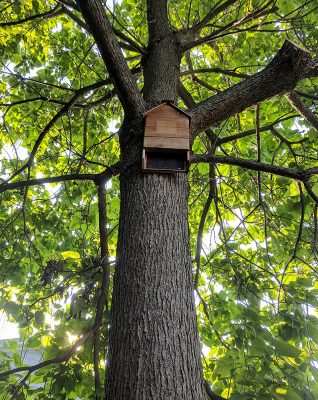How to Be a Friend to Bats
Bats find shelter in dead trees and caves, but people can provide additional roosting sites by constructing bat boxes on the sides of buildings or on top of metal poles. Boxes should receive six to eight hours of sunlight daily, have covering to protect bats from rain and predators, and be located 12 to 20 feet above the ground. Boxes on the sides of buildings retain the most heat, which helps maintain a healthy temperature of between 80 to 100 degrees Fahrenheit during the summer when bat pups are young. The National Wildlife Federation provides a helpful bat box how-to guide at tinyurl.com/build-bat-house.
To attract bats to an open yard, plant flowers like white jasmine and evening primrose or herbs like mint and lemon balm. Planting oak or field maple trees nearby to provide shelter can also attract bats.
And to ensure that a yard is bat-friendly, keep cats indoors. If that is not possible, keep them inside from a half hour before sunset until an hour after, when bats are most active.
During fall and winter, bats typically hibernate in caves or trees. When disturbed by human activity during hibernation, they prematurely burn through their fat reserves, which can lead to death. To respect bats, do not disturb their roosting sites — especially during hibernation season.
Another way to protect bats is by supporting organizations like Bat Conservation International. This global nonprofit group is engaged in researching white-nose syndrome and other threats to bats, educating the public to combat the bat’s negative reputation, and protecting habitats like forests, caves and abandoned mines. Visit batcon.org for more information. — By Jamie Tews
Related Articles
Latest News
More Stories

Leave a comment
Your email address will not be published. Required fields are marked *






Leave a Comment